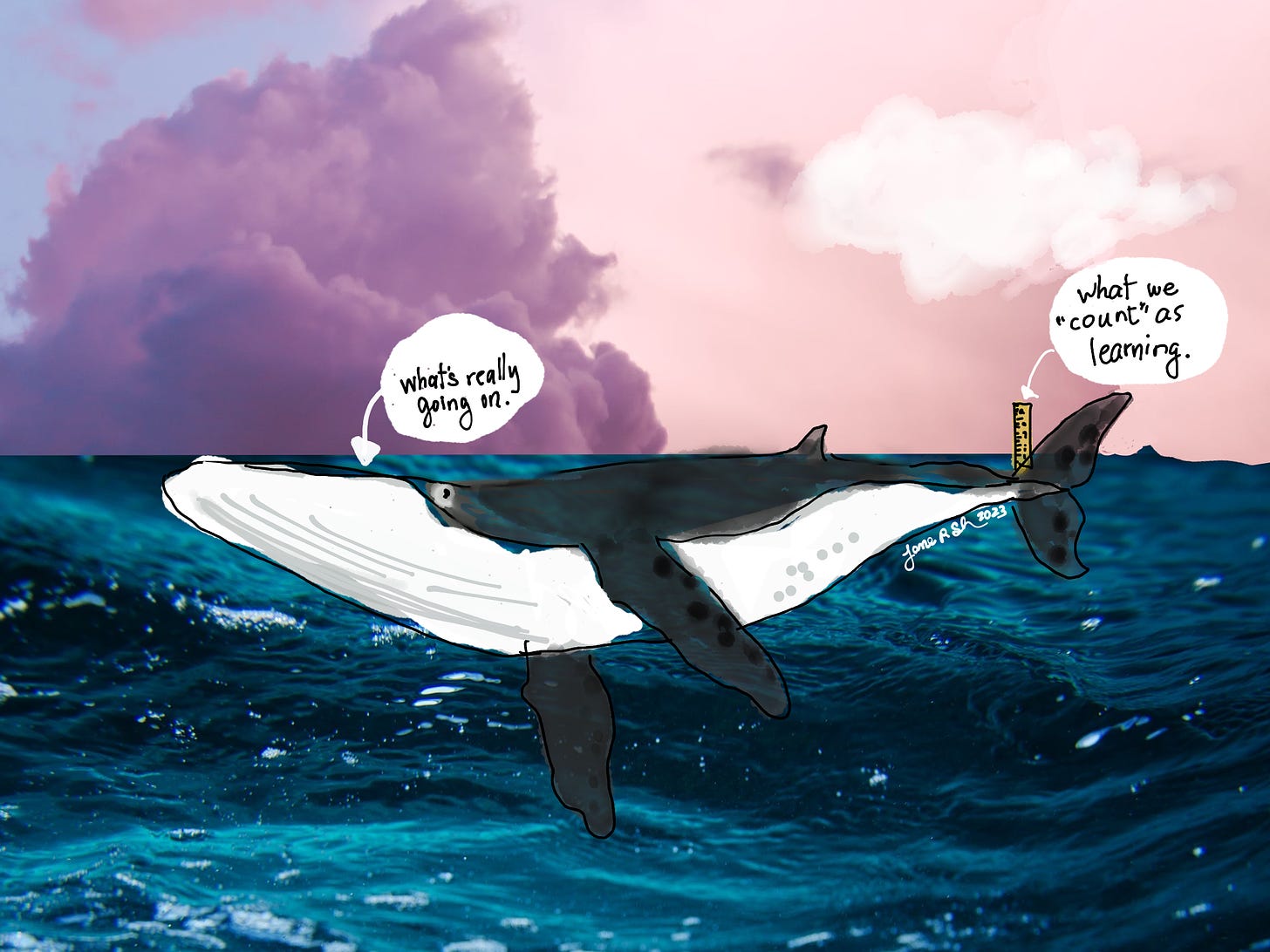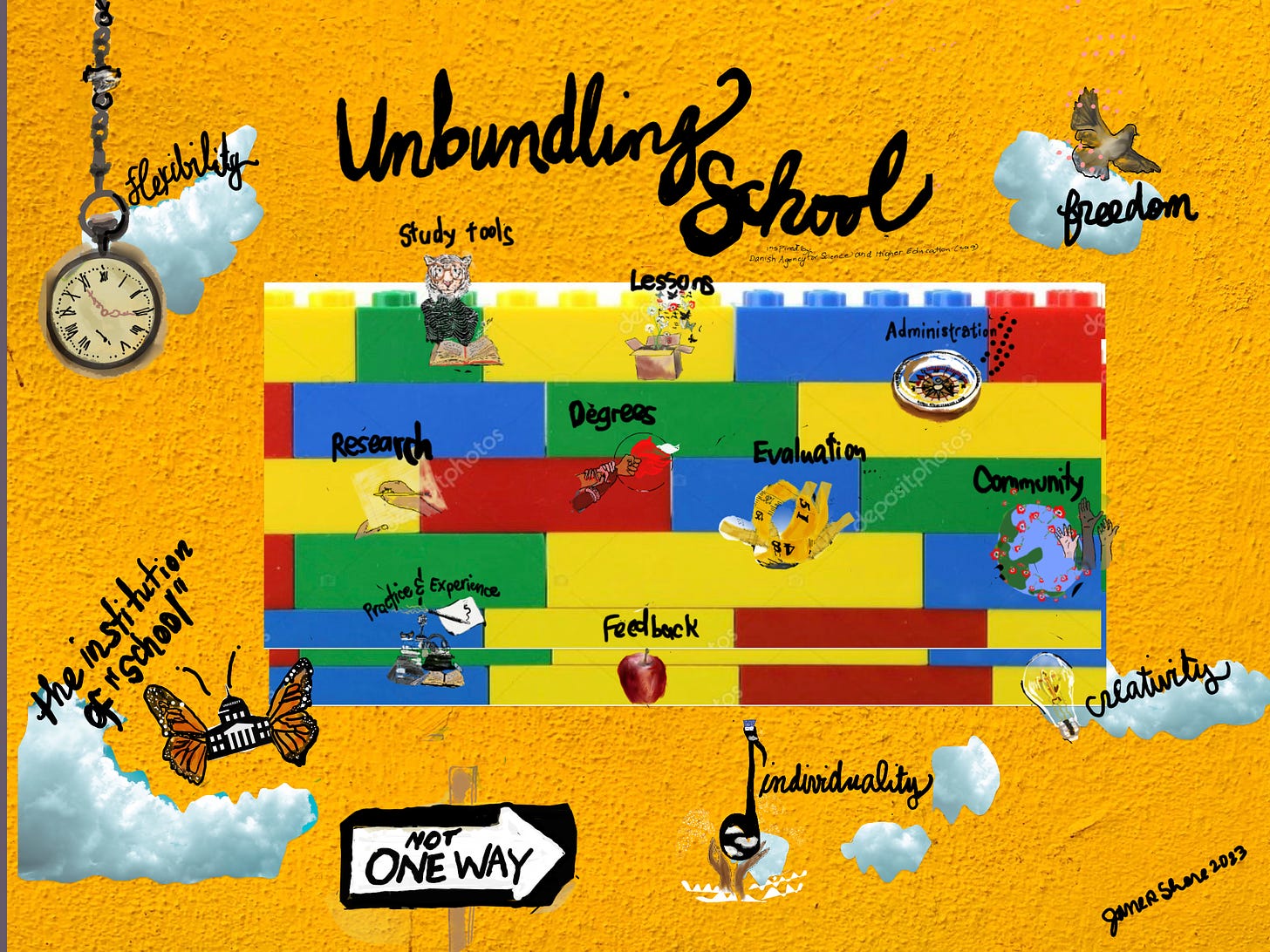If you like what you read, please leave a ♥️ above. I’d love to hear from you.
As we are about to enter another summer season in 2024, a time when we consider young people are “off school,“ I am re-publishing this post.
Summer is a time when young people engage in a lot of learning that does not count in traditional ways. This could be changed. I wonder what you think.
When you think “education”, what image comes to mind?
Likely it is a mix of scheduled bells, desks in rows, and young people sorted by age. Teachers are either at the front of the class or holding some other position of authority. Young people are moving from class to class, learning subjects in siloed succession.1
In reality, young people around the world spend only about 10-20% of their waking hours over the course of a year in school.2 But in that other ~80%, they are learning - in their communities, at work, with siblings and families at home, in out-of-school spaces.
No bells, no assigned seats, no silo’ed learning happens outside school. But these are the places where the foundations built are being applied.
But they do not “count.”
And it is full on summer right now. And though school is officially out for most, there is learning happening all the time in deep and meaningful ways.
How might we honor and credit learning that happens outside school walls?3
In the past decade, I’ve witnessed young people learning to fix cars, build their own businesses and create documentaries. They’ve attended professional conferences, given workshops on climate change, and been part of protests and rallies for issues of deep meaning for them.
Most recently with School of Thought, young people are leading conversations for change around the city of Philadelphia, contributing to meaningful dialogue around the criminal justice system, voting, workers’ rights, belonging, gender equity, and co-creating school.
In each, ingenuity, creativity and initiative were clearly demonstrated. But officially? For those in traditional settings, none “counted” as the type of learning we give credit for in schools.
This is changing, but not systematically and not fast enough.4
How can we collectively extend recognition to those experiences, projects and activities that are not directly tied to school, but nonetheless structurally build valuable skills?
How can we make what counts as learning more equitable and accessible?
The big idea
The fact that schools do not credit out of school learning isn’t just policy. Equally as important are the systemic mindset shifts that must happen.
What we need:
Revised Mindsets Learning does not need to be “schooly” to count as school.
Recognition The community in which a school is exists is part of the school.
Shared responsibility Stakeholders can co-create program.
Revamped models and renewed resources Funding and program models.
School of Thought takes big ideas and makes them usable. Summer School of Thought special happening now. Join us and save.⚡️
As we co-create the world we want, here are some questions I have.
A summer 2024 sidenote: some of these are projects I plan to pursue.
What mindset shifts do we need to open credits for outside school learning? Resources here: Building a credit for outside learning campaign.
Most states no longer have policies regarding “seat time”, but we still abide by it. Why? See this Education Next article and Learn Everywhere Student Participation Maps.
How can we credit learning outside of school? See Revolution School, Making Learning Outside of School Count (Nov. 2021 report)
How can we redesign the role of the teacher so that we aren’t just asking for more, but recognizing expanded learning settings “count”? See this post.
How do we gather funding and resources to support these efforts? Potential funding resources, and How to talk to funders.
Various states have begun to explore how to extend credit to the real world.5 And advocates of this idea have begun using the term “unbundling” as a frame.6
Making Big Ideas Usable
Let’s build flexible systems using drivers that are responsive to real-life—offering a way for learners and their families to tell us what they are doing and customizing a learning framework around that.
It might take creative re-imagining, but it’s more than possible.7
Bringing these opportunities to scale in schools8 requires:
coordination among schools and partners in support of core learning and standards.
cooperative effort to enact policy changes that reduce bureaucratic barriers to non-traditional learning, while ensuring experiences are meaningful and connected.
How students do after graduation is a better measure of the success of a high school than standardized assessments. Research clearly indicates that tests don’t predict success in post secondary settings very well let alone measure life skills.
What counts should be more about young people developing relationships out in the community, seeing connections between what they’re learning and where they want to go. Instead of just adding to their academic transcripts, they can build resumes.
In the end, being able to better describe, credit and more generally signal that qualifications, competencies, and experiences are built across a spectrum of settings will not only open equitable, engaging, authentic opportunities, but also ensure the learning that counts is relevant to the world we have and the world we want.
If you are also in this work and want more, I started building a list of curated resources. Please feel free to add!! I would LOVE others to be able to use and create a collective resource.
For innovative high school models that do not follow this pattern, see Revolution School, Brightworks, Nuvu Lab School, Hudson Lab School and Millenium School.
From the OECD database.
This is not an argument for creating a shortcut toward earning course credit or a means of removing students from a classroom setting or replacing the work of classroom teachers. It is recognition that learning doesn’t always take place during the regular academic day.
In New Hampshire, they call it extended learning experiences. In New York City, expanded learning. New Orleans has Youthforce. Small pockets of innovation are popping up everywhere, but collectively, schools are lagging.
See The AfterSchool Corporation (TASC) site for details. AND the amazing Joanna Lack and her colleagues produced this TASC policy brief more than a decade ago, still relevant today.
An analogy can be seen in the music industry, where streaming services allow customers to purchase single songs instead of albums.
I am not talking about digital badges or some other money making way for external organizations to govern ways to offer credit for out of school learning.
Technical and alternative high schools already incorporate many of these ideas.







Some really interesting ideas and facts shared here. Thank you writing ☺️